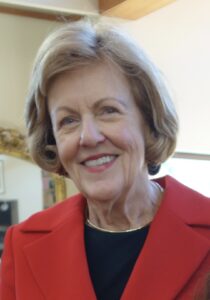
Beverly Beyette Graber, who died Dec. 20 at 91, knew how to get people to tell their stories.
She had plenty of her own to tell. When she was eight, for example, word came that the Japanese had attacked the U.S. Pacific Fleet in Pearl Harbor. Her father, the future Brigadier-General Hubert Beyette, had been bird hunting that day with his good friend Dwight Eisenhower. The two men had served together on the American Battle Monuments Commission after World War I. Beverly recalled how Eisenhower lifted her onto his knee and told her, “Remember this day, Beverly, because the world is never going to be the same.”
Then there was the time that she covered the 1968 Democratic National Convention for the San Diego Union newspaper. When violent confrontations broke out between protestors and police, Beverly’s editor ordered her to take shelter at her hotel. She seethed at the restriction. But the hotel was the Conrad Hilton, so Beverly was right on the scene when the protestors famously crashed through the hotel’s plate glass window into the lobby.
These are just two of the many wonderful anecdotes Beverly could tell from a long and interesting life. But Beverly always spent more time listening than talking. Whether she was interviewing a celebrity or meeting a stranger at a party, she was skilled at drawing people out and making them comfortable enough to tell their own stories.
To her nieces and nephew and their families, she was Auntie B: the fun aunt, the interesting woman that you couldn’t wait to introduce to your friends. You knew what their reaction would be. At first, they might notice her different-colored eyes, one blue and one brown. But that quickly became the least interesting thing about her. She was elegant, but not stuffy. Well informed, but not a know-it-all. She was open-minded, curious, engaged. She felt like a contemporary, not a woman decades older than you. By the end of the evening, the judgment would be unanimous: “Your aunt is so cool!”
Beverly was the youngest of three daughters born to Hubert W. and Jessica Idanthea (Moffatt) Beyette. Her early years involved several moves as her father was sent to different postings; she also served a brief stint at a much-hated boarding school. Once the general retired to Coronado, California, Beverly convinced him to let her enroll in the local public high school, where she thrived. She then attended San Diego State, where she belonged to a sorority and helped edit the yearbook.
Beverly started her journalism career writing about weddings and tea parties. In the 1950s, female journalists were typically confined to the society pages. By the 1960s, though, she was a full-fledged feature writer for the Union, writing about everything from the San Diego Zoo’s new incubator to the Beatles’ first visit to the city. (She declined to mention in the article that Paul McCartney complimented her legs during their press conference, but that became another good story to tell.) She married her first husband, banker John Bennett, and they had one son, Brett.
In the 1970s, she was hired as a features editor by the Los Angeles Times, but quickly realized she’d rather be out gathering stories than editing them. Among the many luminaries she interviewed were two presidents and their wives (the Reagans and the Carters), Rosa Parks and Angela Davis. After taking a buy-out from the Times, Beverly continued to freelance travel stories to the paper until 2019. Her last byline, an obituary she wrote in advance for former first lady Rosalyn Carter, was published in 2023.
Beverly also co-wrote a best-selling book, “Brain Lock: Free Yourself from Obsessive-Compulsive Behavior,” with psychiatrist Jeffrey M. Schwartz. First published in 1996, “Brain Lock” was updated 20 years later and is still in print.
Beverly traveled extensively, first with her parents in post-World War II Europe and later with second husband Gerald S. Graber, an acclaimed historian and author of books about the Nazis and the Armenian genocide. After Graber’s death from cancer, Beverly continued traveling with friends and family, including trips with her beloved son Brett to Japan, Hawaii and Thailand.
Beverly spent a month with us in Paris in 2014 while my husband, her nephew, was on sabbatical. One day while we were out on separate errands, the access code to our apartment building was changed without warning. I fretted about our 80-year-old aunt being locked out, but when she encountered the unbudging door she simply continued strolling around the neighborhood, confident that someone would fix the issue and that she would gain entrance again eventually. As my sister-in-law Bonnie Weston put it, Beverly was “a travel companion who made plans gone awry seem part of the adventure.”
It’s a testament to Beverly’s spirit that her leaving us at age 91 feels like a plan gone awry. We wanted, and expected, more time with this extraordinary woman.